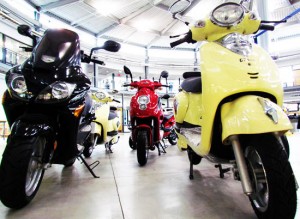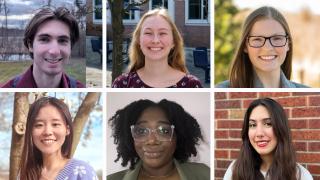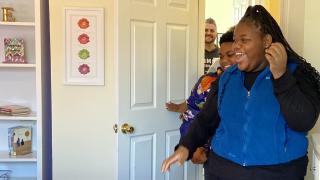

The university received battery-powered electric scooters from Best Buy to aid in research in the emerging technology.
In July, a University of Michigan alumnus and Best Buy employee coordinated the donation of 100 scooters. The College of Engineering at the Ann Arbor campus received 83 scooters, and the remaining 17 came to UM-Dearborn. Faculty members who received the scooters include Chris Mi, professor of electrical and computer engineering; Pravansu Mohanty, professor of mechanical engineering; and Keshav Varde, CECS associate dean and professor of mechanical engineering. The Department of Electrical and Computer Engineering received three scooters for senior design projects. The remaining scooter inventory is being held for future student projects.
Varde is using the two scooters he received to research battery characteristics that will be used in modeling fuel cell hybrid vehicles.
“One of the issues with electric vehicles is the change in power demand with acceleration and deceleration,” Varde said. “Fuel cells aren’t very efficient when they go through these changes. Fuel cells produce electric power—the battery stores the energy. A lithium-ion battery can last a long time depending on the current drawn, its rate, the frequency, and battery characteristics. But we don’t have sufficient knowledge of lithium-ion batteries to determine the optimum ratio of fuel cell size to battery size. By measuring characteristics of the lithium-ion batteries (from the scooters) and using them in our simulation, we can model and design a fuel-cell-powered vehicle with battery energy storage that can optimally power small- to full-size cars.”
Varde says students from the mechanical engineering and automotive systems engineering programs will assist with the investigation. The scooter donation will help them gain experience in working with emerging battery technology.
“The scooter donation from Best Buy helps us to provide our students with hands-on experience in lithium-ion battery technology and its integration in vehicles,” Varde said. As the cost of fuel cells decreases, fuel-cell-powered vehicles with battery energy storage may become more viable. The scooter donation will help us prepare our students not only for today’s technology, but for the technology that may show up in the marketplace in the near future.”
Mohanty and his students will use the scooters to test the prototype solid-state batteries they have fabricated. Solid-state batteries eliminate fire hazards associated with current lithium-ion batteries. Mi and his students will examine ways to enhance battery safety, reliability, and drive range.
“Electric cars represent the future of transportation,” Mi said. “As we work on extending the life and range of the batteries, as well as reducing their cost and charging time, we can help further the development of electric vehicles. The generous donation from Best Buy will help bring us closer to making electric vehicles a safer and more viable means of transportation.”



